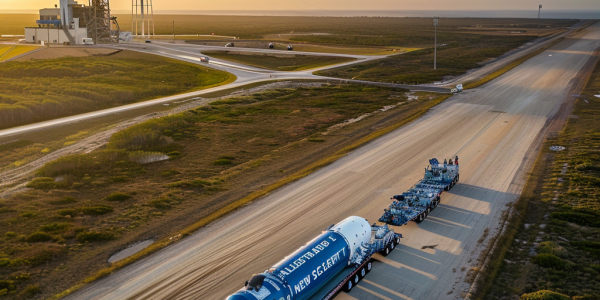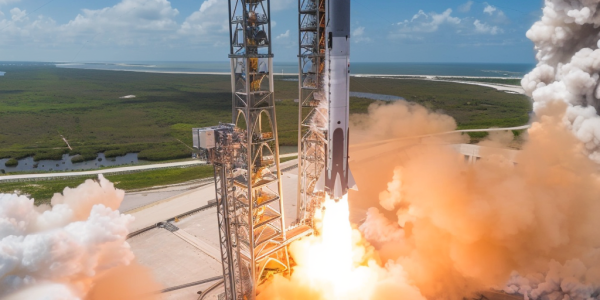Blue Origin Advances New Glenn Rocket Preparations with First Stage Booster Transport
Blue Origin is gearing up for the inaugural launch of its New Glenn rocket, successfully transporting the first stage booster to Cape Canaveral Space Force Station. With a target launch window in November, the impressive 188-foot booster, powered by seven BE-4 engines, marks a significant milestone in the company’s quest to establish a reliable heavy-lift launch vehicle. As excitement builds, Blue Origin’s preparations highlight its commitment to advancing commercial space exploration.
Blue Origin Successfully Conducts Hot-Fire Test for New Glenn Rocket Ahead of Inaugural Launch
Blue Origin successfully completed a hot-fire test of its New Glenn rocket’s second stage, marking a crucial step towards its inaugural launch in November. This test evaluated key systems, including the BE-3U engines, ensuring readiness for upcoming missions. With a height of over 98 meters, the New Glenn is set to enter the competitive heavy-lift launch market, enhancing efficiency and sustainability in space exploration.
U.S. Space Force selects Blue Origin, SpaceX, and United Launch Alliance for National Security Space Launch Phase 3 program
Blue Origin, SpaceX, and United Launch Alliance have been chosen by the U.S. Space Force for the National Security Space Launch Phase 3 program, with contracts potentially valued at $5.6 billion over the next five years. This milestone marks the first time Blue Origin will launch sensitive national security satellites, while SpaceX and United Launch Alliance have previously held Phase 2 contracts. The NSSL Phase 3 program includes two lanes for different types of missions, with Lane 1 focusing on less demanding launches to low Earth orbit. The selection of these three companies confirms their capabilities met the specified criteria, as revealed by the Department of Defense’s announcement.
Blue Origin’s New Shepard Parachute Issue During NS-25 Mission
Blue Origin’s recent New Shepard suborbital flight encountered a parachute issue when one of the three parachutes on the crew capsule failed to fully inflate during the NS-25 mission. Despite this malfunction, the capsule landed safely with the other two parachutes functioning correctly. NASA officials were briefed about the problem, highlighting the importance of transparency and cooperation. Post-flight reviews are ongoing to analyze the parachute incident further.
Jeff Bezos’ Slow Morning Routine Defies Typical Productivity Norms
Discover Jeff Bezos’ leisurely morning routine that defies the typical image of a highly productive individual. From savoring coffee to engaging in a slow-paced morning ritual, Bezos emphasizes the importance of maintaining a relaxed approach to his mornings. Learn how his preference for a laid-back morning aligns with his belief in the value of wandering and fostering creativity. Explore the benefits of dedicating time to relaxation and mindfulness in the morning for improved overall performance and well-being.
Blue Origin Achieves Milestones in Development of Orbital Reef Space Station
Blue Origin, the space company founded by Jeff Bezos, has achieved a significant milestone in its contract with NASA to develop a new space station, Orbital Reef. The $172 million contract aims to create a space station capable of supporting both astronauts and tourists. NASA’s investment in potential replacements for the International Space Station has led to the collaboration between Blue Origin and Sierra Space in the development of Orbital Reef. Recently, NASA announced that Blue Origin has successfully passed four key milestones, demonstrating the progress of Orbital Reef’s crucial technology. One of the notable achievements is the development of a system to recycle urine from future astronauts and tourists. These milestones are essential in ensuring that Orbital Reef can sustain human life in space, as stated by Angela Hart, manager of NASA’s Commercial Low Earth Orbit Development Program.
New Company Aims to Mine Helium-3 on the Moon and Bring it Back to Earth
Interlune, a new company founded by former Blue Origin employees, aims to extract helium-3 from the lunar surface and bring it back to Earth. With $15 million in funding and a focus on deriving value from lunar resources, Interlune’s venture could pave the way for a new era of wealth creation in space. Despite challenges, the company is optimistic about the timing of their venture and the potential for a new lunar economy.







